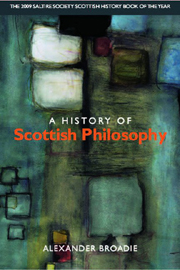Book contents
- Frontmatter
- Contents
- Acknowledgements
- 1 Introduction
- 2 John Duns Scotus
- 3 The Fifteenth Century
- 4 The Circle of John Mair
- 5 Humanism and After
- 6 Scotland Moves into the Age of Enlightenment
- 7 David Hume
- 8 Adam Smith
- 9 The Scottish School of Common Sense Philosophy
- 10 The Nineteenth Century: Ferrier to Seth
- 11 Realism and Idealism: Some Twentieth-century Narratives
- 12 Conclusion
- Bibliography
- Index
2 - John Duns Scotus
Published online by Cambridge University Press: 12 September 2012
- Frontmatter
- Contents
- Acknowledgements
- 1 Introduction
- 2 John Duns Scotus
- 3 The Fifteenth Century
- 4 The Circle of John Mair
- 5 Humanism and After
- 6 Scotland Moves into the Age of Enlightenment
- 7 David Hume
- 8 Adam Smith
- 9 The Scottish School of Common Sense Philosophy
- 10 The Nineteenth Century: Ferrier to Seth
- 11 Realism and Idealism: Some Twentieth-century Narratives
- 12 Conclusion
- Bibliography
- Index
Summary
Section 1: Life and works
The Franciscan friar John Duns Scotus (c.1266–1308) was born in the village of Duns in Berwickshire in the Scottish Borders. The Scottish philosopher/theologian John Mair (c.1467–1550) reports that:
When [Scotus] was no more than a boy, but had been already grounded in grammar, he was taken by two Scottish Minorite [i.e. Franciscan] friars to Oxford, for at that time there existed no university in Scotland. By the favour of those friars he lived in the convent of the Minorites at Oxford, and he made his profession in the religion of the Blessed Francis.
It is supposed that it was in the late 1270s that Scotus began his studies at Oxford, first in arts and then in theology. On 17 March 1291 he was ordained into the priesthood, a date that permits an educated guess regarding his year of birth, for since twenty-five was the minimum age for ordination, and since Scotus was evidently a person of immense and precocious talent, it is probable that he was born on or not long before 17 March 1266.
While at Oxford he lectured on the Sentences of Peter Lombard (c.1100–c.1160), a theologian whose set of four books of Sentences (Sententiae = opinions) remained central to the teaching of theology in the Catholic church for at least the following three centuries. By 1300 Scotus had begun revising his lectures, but the revision was far from complete when he was sent to Paris to lecture there on Lombard's Sentences.
- Type
- Chapter
- Information
- A History of Scottish Philosophy , pp. 7 - 33Publisher: Edinburgh University PressPrint publication year: 2008



